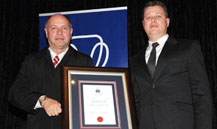 |
Mr Mickey Gordon, Head of Marketing at the UFS, with Jaco Loubser (right), Kovsie Alumnus of the Year.
Photo: Dries Myburg
10 September 2012 |
Jaco Loubser, the producer of television programmes such as Shoreline on SABC and Groen, Roer and MK Kampus on kykNET has been named as the Kovsie Alumnus of the Year by the University of the Free State (UFS). Loubser and five other Kovsie alumni were honoured for outstanding achievements and contributions at the Kovsie Alumni Awards held on the Bloemfontein Campus.
Jaco, who obtained a master’s degree in Zoology from the UFS, received the award for outstanding achievements on national and international level for his contribution to and development of the South African film and television industry.
Prof. Stephen Brown, Associate Professor in the Department of Paediatrics and Child Health and Prof. Hennie Theron, Associate Professor in the Department of Cardiology, received the Cum Laude Award for exceptional service for a specific profession. Profs. Brown and Theron were recognised as pioneers in the development and application of medical technology, as well as for their pioneering work in paediatric care.
The Kovsie Alumni Awards for outstanding service to the UFS was also shared by two people, namely Prof. Hendri Kroukamp, Dean of the Faculty of Economic and Management Sciences, and Advocate Wessels Oosthuizen, Director of the Centre for Financial Planning Law at the UFS. The Kovsie Ambassador’s Award went to Prof. Matie Hoffman, Associate Professor in the Department of Physics.
Jaco thanked Prof. Hoffman in his speech and said it was good to share the stage with one of his former lecturers. Jaco, who has received numerous awards for his television programmes, said the Kovsie Alumni Award was unexpected and it was a great honour to receive it from his alma mater.